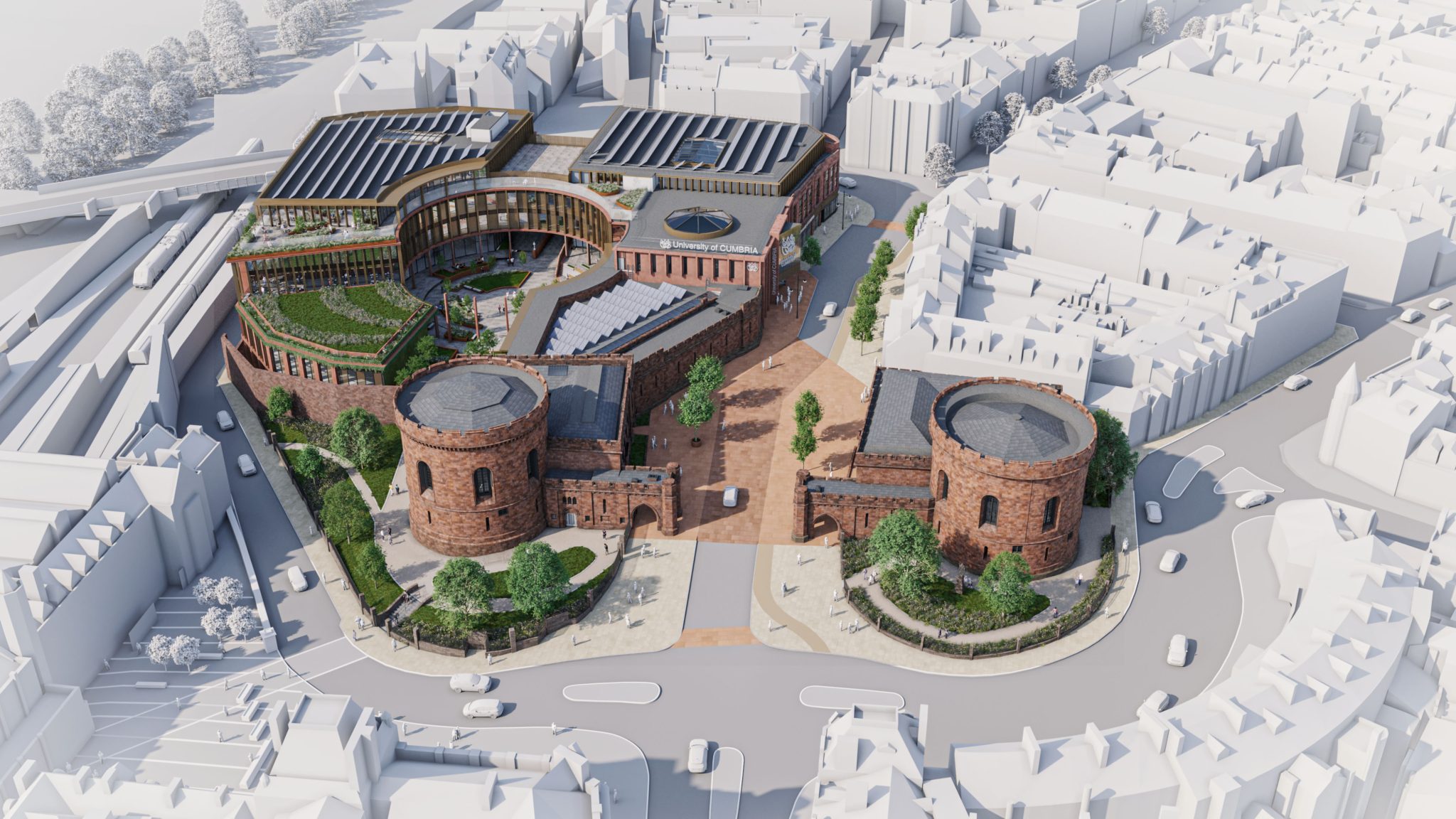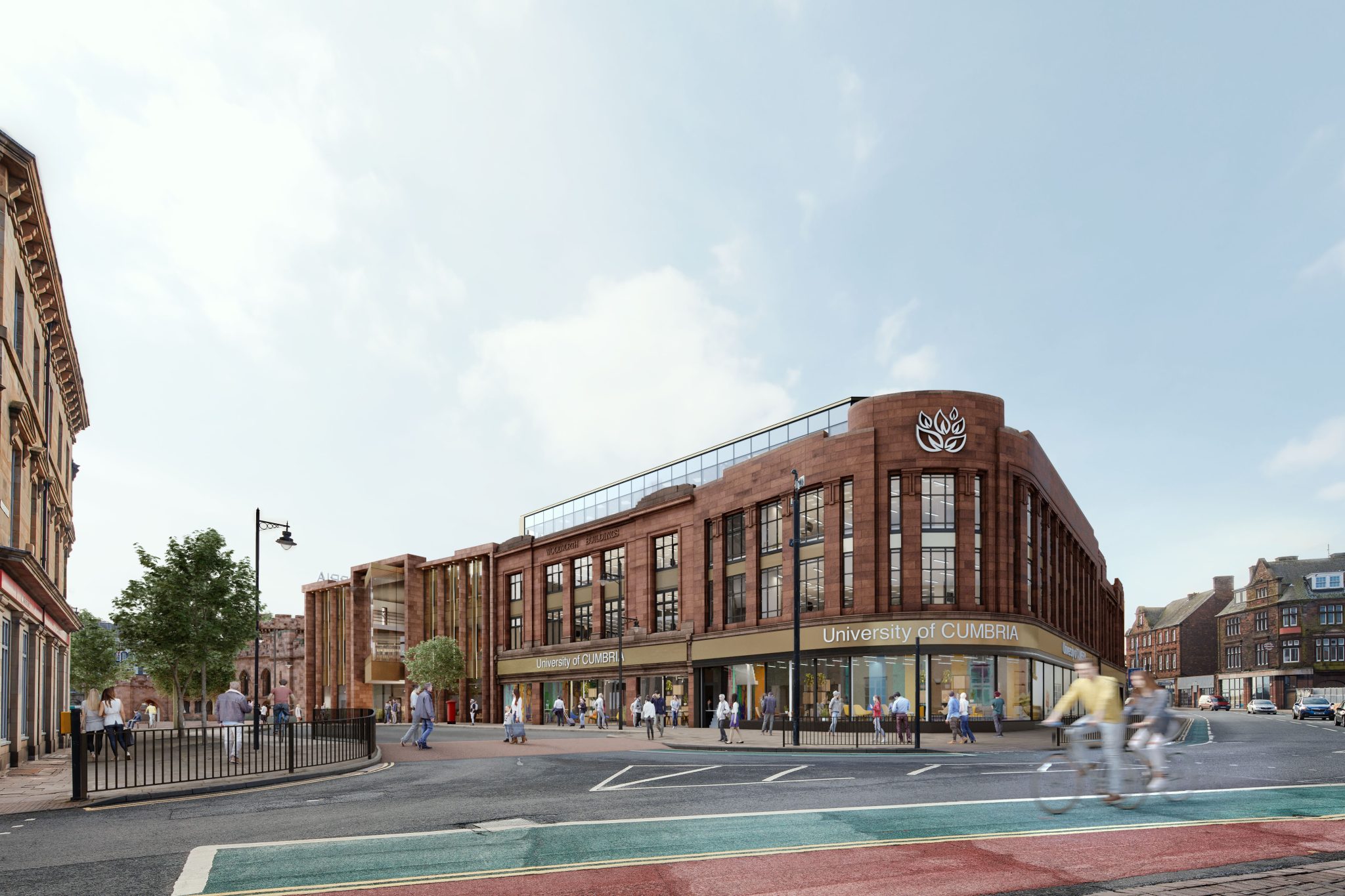Michelle Davies, Head of Education and Director DPP Planning outlines how the education sector can have a pivotal role to play in the levelling up of key regions of the UK, including the repurposing of town and city centres that have lost economic and social impetus. However, the potential for education-led regeneration can be stifled by the current planning system.
One local authority that has shown the foresight to embrace the opportunities educational facilities can provide for urban areas is Carlisle City Council that recently granted planning permission for the University of Cumbria’s new City Centre campus, which was secured by DPP Planning.
Named ‘The Citadels’ because of the inclusion of two Grade I listed towers within a former medieval fortress, the scheme is part of the proposed wider transformation of Carlisle City Centre taking place over the next five years, ensuring Carlisle reaches its full potential as the hub of the Borderlands area.
Featuring 11,500 sqm of floorspace, the campus will provide a mix of high-quality and fully digitally enabled teaching spaces, a 200-seater multi-purpose lecture theatre and internal and external exhibition areas which will also be available and accessible to visitors to the centre.
£50 million of funding for the project is being provided by the Department for Levelling Up, Housing and Communities (DLUHC) through the Borderlands Inclusive Growth Deal.
It has also recently been confirmed that £4million from the Carlisle Town Deal Fund will fund a proposed 800 sqm Business Interaction Hub within the scheme, to be known as the Carlisle Business Exchange (CBE). The University is providing the remainder of the funding needed to meet the £77.5 million total cost.
From a planning, but also a regeneration perspective, what makes this scheme so interesting and innovative, apart from the re-purposing of heritage assets of national significance, is the fact that it will completely re-purpose a significant area of a primary shopping area within a city centre.
Much of the site, including ‘The Citadels’ buildings themselves is vacant. The retail frontage, housed in the former Woolworths and Burtons Building, comprises several small retail units, some of which are also vacant.
The entire site is allocated in the 2016 Local Plan as a Redevelopment Opportunity, recognising that the retail focus of Carlisle has shifted. In fact, the retail landscape, as has been well documented, has changed completely across the country.
The continued impact of online shopping on high street stores, which has been growing in the last decade and accelerated as a result of the pandemic. They are, of course, also far from immune to the current economic crisis.
The decline in high street retail has brought into sharp focus the need for town and city centres to reinvest themselves. Unfortunately, the planning system often inhibits the opportunity for change.
Policies restricting the loss of retail units in Primary Shopping Areas are still common and changes to the areas of planning such as ‘Use Classes Order’ and enhanced ‘Permitted Development Rights’ only really allow for small-scale changes.
National Planning Guidance recognises that the vitality and viability of town centres is reliant on more than just retail, but Local Planning Authorities are often slow or unwilling to acknowledge this.
In supporting this scheme, Carlisle City Council has adopted a forward -looking approach. This scheme is a unique example of a city centre-based regeneration scheme that is not focussed around retail, leisure or residential development.
It will, however, be a catalyst for some, if not all of those types of supporting developments as the benefits of ‘The Citadels’ for Carlisle will be huge and extend beyond the place-making benefits of physical regeneration and viable re-use of heritage assets.
The scheme will increase footfall and boost the vibrancy and vitality of the city centre. Over the 20-year period from opening, the higher education facilities will increase the total number of full-time equivalent students by 1,200 each year.
In addition, the project will improve engagement with employers and so help expand the number of people already in the workforce involved in higher skills development.
The Campus will contribute to more inclusive growth across the Borderlands by facilitating access to higher education from all communities, working with local partners including FE Colleges, and thereby increasing the rate of higher education participation in what has been a higher education black spot.
In addition, the Carlisle Business Exchange element will encourage and maximise innovation and collaboration with the university, for both staff and students, for external businesses located in or moving to the CBE. These will include start-up businesses, through to scale-up businesses and flexible ‘touch down’ space for larger business.
Delivering high skilled and well-paid jobs is a cornerstone of the levelling up agenda. Universities will play a fundamental part in ensuring industries and regions, particularly in the North, can develop and retain the skilled people needed for those roles.
However, education is ideally placed to make a broader impact on levelling up, which needs the support of more forward-thinking local planning authorities to reverse the fortunes of town and city centres that are no longer as relevant as they were 15 or 20 years ago.
Images: DAY Architectural Ltd.







